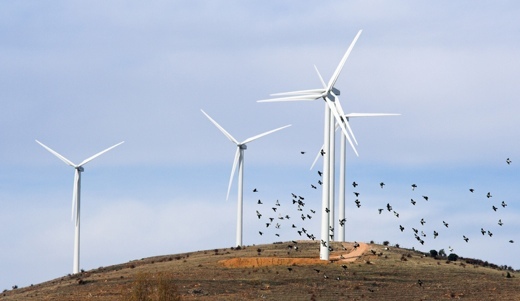Green energy, specifically solar and wind, has been sold to the American public as the answer to a host of crimes against the planet—but green has a big downside.
Hundreds of acres of photovoltaic solar panels confuse migratory water birds, such as the “once-
critically endangered brown pelican whose lifestyle involves fishing by diving into open water,” to veer miles out of their way to dive toward what they perceive are lakes or wetlands—only to die from “blunt force trauma.” At the largest solar thermal plant in the world, Ivanpah, the 170,000 reflecting mirrors—designed to “superheat liquid in boilers”—literally fries feathers. The USA Today reports that the intense radiation—called solar flux—has singed some birds, melted feathers, and denatured the protein in their wings as they fly through the intense heat. Unable to fly, the injured birds drop out of the sky and die.
The birds being lured to their death by solar power plants may get a reprieve.
USA Today references a “solar-industrial corridor” along I-10 in Riverside County, California, which was to have 80 percent of its 148,000 acres covered with solar panels or mirrors. However, it reports: “Today, that seems unlikely. Industry trends are toward smaller solar projects and the U.S. Department of Energy’s (DOE) loan-guarantee program has ended.” Additionally, Friday, December 13, was unlucky for the solar industry—but lucky for the birds. Giving official recognition of the threat solar power tower projects pose to wildlife, the California Energy Commission announced that it is “likely to deny approval to a major Riverside
County solar power project that has been criticized for posing an unacceptable risk to birds and other wildlife.”
The bald and golden eagles aren’t so lucky.
The Friday before, December 6, the Obama Administration announced an extension of the existing five-year eagle take permit. Effective immediately, the new rule issued by the Department of Interior (DOI) will grant 30-year permits allowing wind farms to “accidently kill federally protected eagles.” The “rule” is in direct violation of the Bald and Golden Eagle Protection Act passed by Congress in 1940.
Wind turbines chop up bald and golden eagles, and other endangered species—like a Cuisinart. If the DOE were to meet its 2030 goal of having 20 percent of the nation’s electricity generated from wind, the authors of a new study on bird collision mortality at wind facilities project: “a mean annual mortality estimate of roughly 1.4 million birds.”
To encourage Interior Secretary Jewell to reverse the DOI decision, the National Audubon Society has set up a direct email option with a customizable letter to Secretary Jewell that states: “The 30-year permit rule is a blank check for the wind industry and provides no comfort or confidence at all that you will be protecting America’s majestic Bald and Golden Eagles and safeguarding their populations.”
Like the expiration of the DOE loan guarantee program has increased the likelihood populations of migratory birds will survive death by renewables, the pending expiration of the Production Tax Credit (PTC) for wind energy could help the eagles and other raptors that are attracted to the towering turbines.
A December 12 Wall Street Journal (WSJ) editorial, “Powering Down the Wind Subsidy,” points out, as the subtitle states: “How Congress can achieve something by doing nothing.” The WSJ is encouraging Congress to “do nothing” and allow the PTC to expire as scheduled on December 31—which would save taxpayers $18 billion over the next five years. Expire it may, as the current budget deal takes away last minute negotiations that got it extended last year—but that doesn’t mean it is really gone. The PTC has expired several times in its twenty-year history and has been extended retroactively. The WSJ states: “The wind lobby is now trying to get the subsidy included in a January ‘tax extender’ package and made retroactive.”
Senator Ron Wyden (D-OR), Chairman of the Energy and Natural Resources Committee, on December 13, for the first time hinted, according to Politico.com, that he may push the Senate to consider a tax extenders package. Wyden said: “If you didn’t have tax reform and you didn’t have extenders, you’d do crushing damage to solar, wind and renewables.” No mention was made of the “crushing damage” to America’s migratory bird population or to the bald and golden eagles.
Wyden will likely have his way. While, Republicans generally oppose government subsidies and support the energy that actually works, and Democrats, like Wyden, tend to favor government giveaways and support the energy that they “hope” will “change” and actually work—there are plenty of Republicans who will help him push the “extenders” package and give the PTC back. Senator Chuck Grassley (R-IA) is the ranking Republican on the Senate Finance Committee, where the PTC extension originates, and he recently predicted a PTC extension. With just a handful of Republicans, such as Orin Hatch (UT), Pat Roberts (KS), John Thune (SD), and Mike Crapo (ID)—all of whom voted for the extension in 2012, the PTC could be hailed a “bipartisan victory.”
Think of the millions of birds being killed by renewables. Think of the billions of taxpayer dollars that have gone down the drain in “the quest for the holy grail of cheap renewable power.” Whether you oppose death by renewables for avian or economic reasons isn’t important. But what does matter is making your opposition to continuing wind welfare heard.





